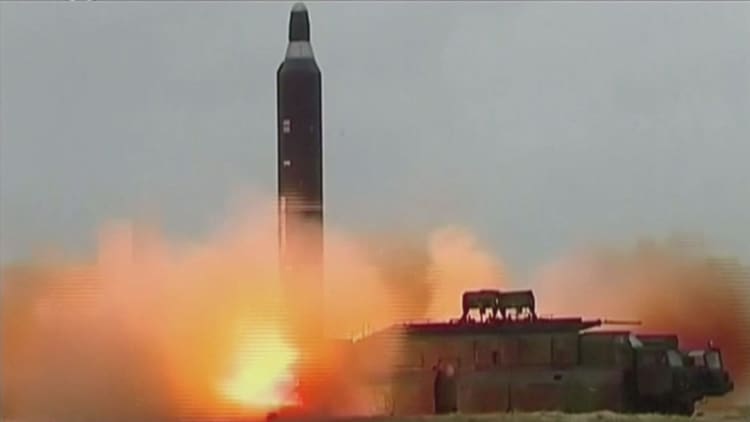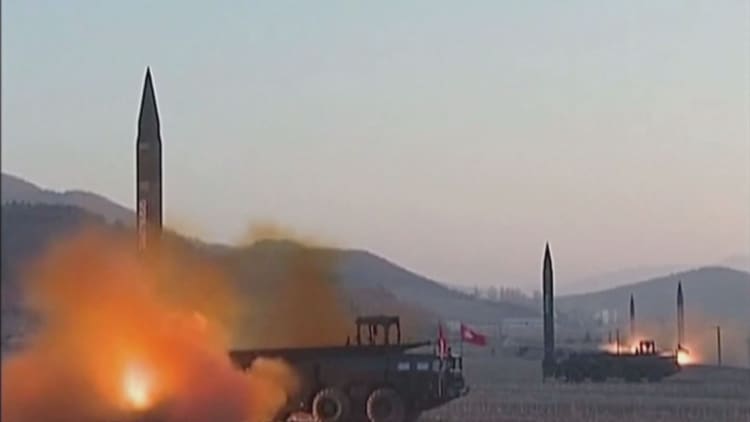A North Korean war would be "catastrophic," but the U.S. would ultimately prevail, U.S. Defense Secretary James Mattis told Congress on Thursday.
"I will suggest that we will win," the retired four-star general said in testimony before the House Appropriations Subcommittee on Defense. "It will be a war more serious in terms of human suffering than anything we have seen since 1953."
He added: "It will involve the massive shelling of an allies' capital [Seoul], which is one of the most densely packed cities on Earth. It would be a war that fundamentally we don't want. Our allies and us would win at great cost."
Mattis also said Japan would be among the countries that would be potentially affected by such a "catastrophic war" with North Korea.
"We're exhausting all possible diplomatic efforts," he said.
Mattis said those efforts include continuing to press for help from China, a longtime ally of North Korea and its largest trading partner.

"North Korea is today a strategic burden to them; it's not a strategic asset," he said. "China has actually responded in some ways positive."
Mattis was referring to China participating in a recent unanimous vote in the United Nations' Security Council for increased sanctions against Pyongyang. The council agreed to slap a travel ban and asset freeze on just over a dozen North Korean individuals and several entities, including the North's Koryo Bank, linked to the finances of key officials of the secretive state.
Even so, some observers believe China could do more to pressure Pyongyang to abandon its nuclear and ballistic missile programs.
"North Korea employs a global array of overseas networks to circumvent international sanctions and continue its pursuit of nuclear weapons," according to a "Risky Business" report released this week by the Washington think tank C4ADS. It added that China trade was "the largest market exploited by" the Pyongyang regime.
In Seoul, meanwhile, South Korea's President Moon Jae-in on Thursday opened the door to dialogue with North Korea but laid out conditions that include stopping nuclear and ballistic missile tests.
"I make it clear that if North Korea stops making additional nuclear and missile provocations, we can come to dialogue with North Korea without conditions," he said in remarks at a peace center in Seoul.
The South Korean president said he's open to holding parallel talks on both denuclearization and a peace treaty to formally end the Korean War.
"I am willing to discuss, sitting knee to knee and putting our heads together, how we will implement the existing inter-Korean agreements. We will be able to talk comprehensively about the complete dismantling of North Korea's nuclear program, the establishment of a peace regime on the peninsula, and even the normalization of North Korea-US relations."
Moon, whose parents were refugees from North Korea, won the presidential election last month and had campaigned on rebooting Seoul's tough approach to Pyongyang.
A former human rights lawyer, Moon's approach is different from that of his predecessor, Park Geun-hye, a conservative who was critical of the effectiveness of a so-called Sunshine Policy approach that included humanitarian aid to North Korea and cooperation on projects such as the Kaesong Industrial Park.
"North Korea must give up its nuclear development and find ways to work with the international community," Moon said. "North Korea's decision to give up nuclear weapons will be a symbol showing its determination to implement what has been agreed between the South and the North."
North Korea has test-fired at least 10 ballistic missiles this year, including new midrange missiles that can carry nuclear warheads. The hermit regime's 33-year-old leader, Kim Jong Un, has been in charge since 2011 and conducted more ballistic missile tests and twice as many nuclear weapon tests as his father and grandfather did during their rule.
North Korea's Rodong Sinmun newspaper Thursday said that advancements in the country's missile and nuclear weapons programs have led to the regime becoming a "dignified nuclear and rocket power" and added that Pyongyang stands "open" to reunification and engaging in "bringing about a great turn and change in the north-south relations."
The North Korean paper held out hope that the new president of South Korea would help reduce tensions on the Korean Peninsula. It also blasted the past nine years of conservative leadership in South Korea, charging they "valued cooperation with outsiders more than the nation's interests and openly pursued the policy of submitting to the U.S."
Meanwhile, Seoul's Korea Herald newspaper reported that the North Korean leader is "extremely nervous" about the possibility of being assassinated. It cited comments attributed to a South Korean intelligence official who briefed national lawmakers in Seoul on Thursday.
"Due to concerns over potential airstrikes and assassination attempts, the young tyrant prefers to move at dawn and uses his subordinates' cars, such as a Lexus car, not his own Mercedes-Benz 600," the paper reported.
As a result, the report added that the North Korean leader has curtailed his public activities significantly. Then again, it said the change could be a reflection of a dictator now "confident about his grip on the communist state."
Watch: US sanctions over North Korea arms



